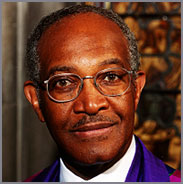James A. Forbes, Jr. Whose Gospel? A Concise Guide to Progressive Protestantism. The New Press, 2010. ISBN: 9781595583970.
James A. Forbes Jr. is a leading voice in the progressive Protestant movement. In 1989 he became the first African American to serve as Senior Minister at The Riverside Church in New York City: a congregation well known for its promotion of progressive causes and self-described as interdenominational (American Baptist and United Church of Christ), interracial, & international. In 2007, Forbes shifted roles and became Senior Minister Emeritus. Since that time he has been the President and Founder of the Healing of the Nations Foundation: a non-partisan, interfaith, not-for-profit organization for the promotion of a holistic understanding of health and wellness. Earlier in his ministry, Forbes was a professor of preaching at Union Theological Seminary after serving as pastor of three congregations. Forbes is known as a preacher’s preacher and was recognized as one of the twelve most effective preachers in the English-speaking world by Newsweek in 1996.
Book Basics
Whose Gospel? is a thoughtful, constructive, and pastoral introduction to progressive Protestantism in the early twenty-first century. Written in a style that is inviting and accessible, Forbes shares parts of his own journey of faith within the context of explaining what he views as six key issues for progressive Protestants: sexuality, gender equality, racial justice, economic class, war, and the environment. Beginning with the assertion in the introduction that “Jesus was progressive,” he builds a sound modern, sociological, and theological case that invites all readers to consider finding their spiritual home within this tradition (p.2).
So What?
Most people reading this blog identify themselves as Protestant Christians, but within that broad category there is considerable diversity. My readers represent the beautiful diversity of this body: spanning the theological spectrum (from conservative to progressive), belonging to local congregations that come from denominational traditions and non-traditional movements, and seeking to live out their faith in their many spheres of influence.
If you consider yourself a conservative or a moderate or disdain labels that seek to broadly characterize one’s theology, I encourage you to read this book to gain a deeper understanding of your progressive sisters and brothers. In these pages you will find no coercive attempts to convert nor any prolonged negative pronouncements of those holding differing perspectives. You will find one man’s understanding of this tradition in its current form along with his admission that his view has been shaped by a number of individuals and communities.
If you consider yourself progressive, I encourage you to read this book as a refresher course to reorient yourself to the big picture that is sometimes obscured by personal preferences or local church passions. In reading, you will also encounter new information or information that looks at much discussed issues in a fresh way.
- In building a case for the progressive position on sexuality, Forbes constructs a lifelong class and passes along some of the experiences that challenged and changed his perceptions. This chapter stands out as the most postmodern chapter in a mostly modern primer. By providing specifics of how his view changed over time, Forbes sets a tone of healthy humility, which continues as he explores the other five elements.
- In building a case for peace, Forbes suggests that, “War violates all Ten Commandments” (p.114). Additionally, he considers the ways in which war breaks each commandment.
Take some time to learn more about a Christian tradition other than your own. Choose a specific tradition then read about it. After you gain a basic understanding explore that further by talking to a few people who consider that tradition to be their spiritual home and by participating in at least one worship service.
